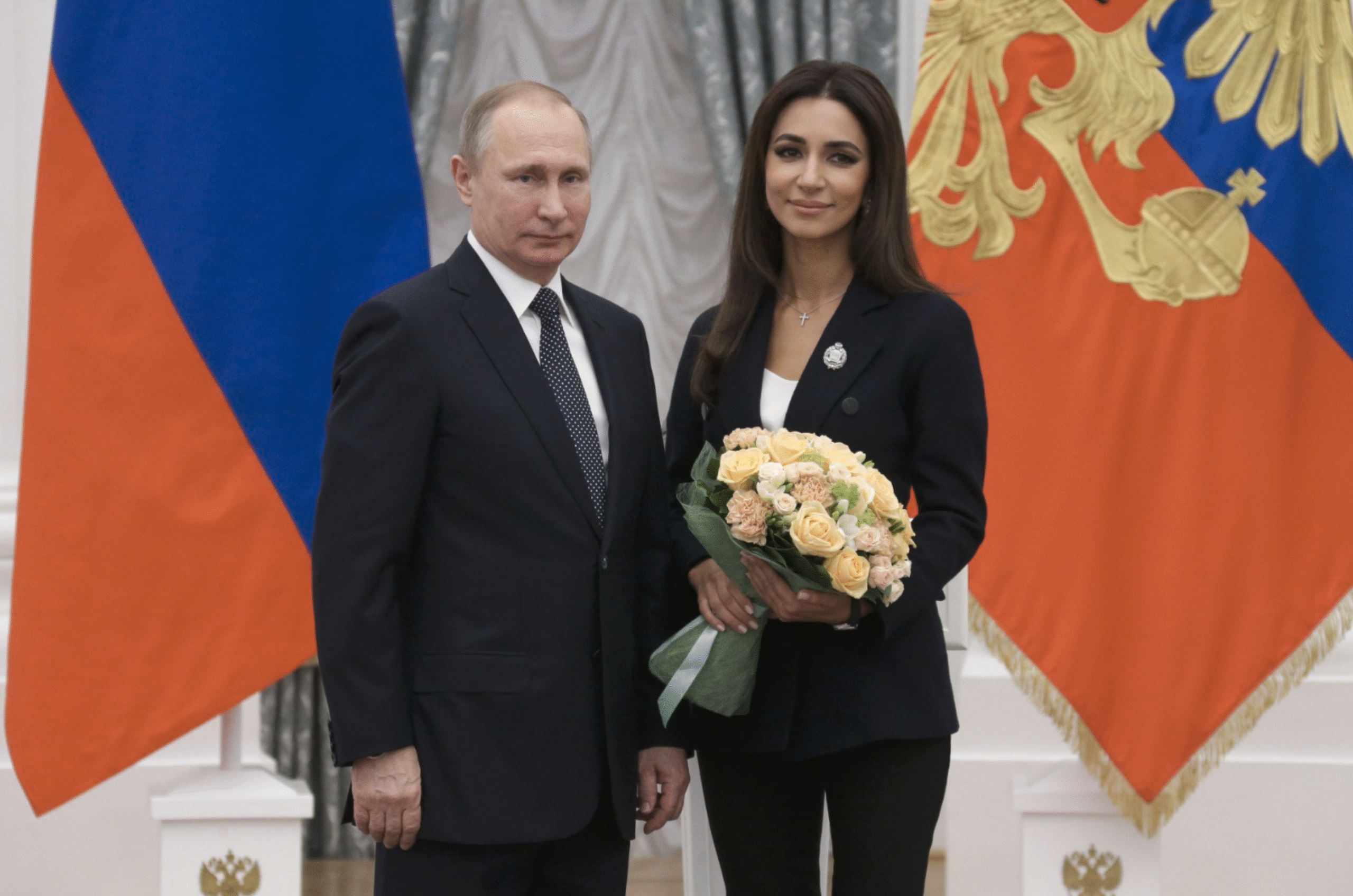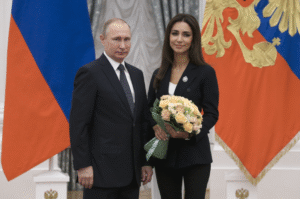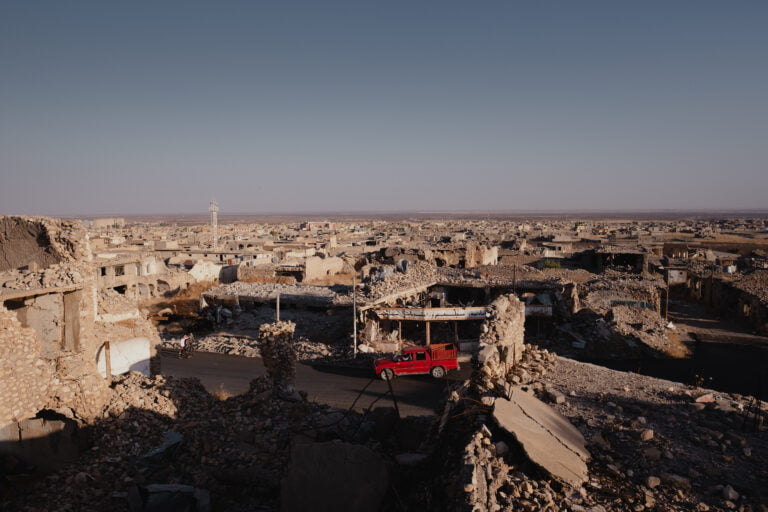In our continuous effort to give voice to the Ezidi people, we are once again publishing this article about one prominent Ezidi singer in Russia who, instead of being a strong voice and advocate for the Ezidis, has betrayed her people and roots—choosing instead to join hands with a blasphemer, Sivan Perwer (Shvan Perwer).
When Russian forces became involved in Syria, she performed and was awarded the “Participant of the Military Operation in Syria” medal by the Russian Ministry of Defense for her support of the military operation. However, when the same unfortunate fate struck her own people—the Ezidis in Shingal—she remained silent. Evidently, since the Russian government had no interests in the Ezidis, neither did Zara, despite the fact that it was her fellow Ezidis who were suffering.
Who Is the Singer Zara?
Zarifa Pashaevna Mgoyan, known as Zara, is a prominent Russian singer and actress of Ezidi heritage, born in 1983 in Leningrad (now St. Petersburg). Her father, Pasha Binbashievich Mgoyan, is a candidate of physical and mathematical sciences, and her mother is Nadi Djamalovna Mgoyan. Zara began her musical career at age 12, quickly gaining recognition through national and international contests. With nine studio albums and numerous prestigious awards, her repertoire includes Soviet-era classics and contemporary music. A graduate of the St. Petersburg Academy of Dramatic Art, she is also a recognized actress. Proud of her Ezidi roots, Zara promotes Russian music worldwide and engages in humanitarian work supporting children and youth with disabilities. In 2016, she was named a UNESCO Artist for Peace, performing in multiple languages and fostering cultural dialogue while honoring her ancient Ezidi heritage.
Zara: The Ezidi Artist Bridging Cultures Through Music and Charity?
Yet Zara, regrettably, has brought nothing but shame, harm, and betrayal to the Ezidi people.
Over the years, Zara has exhibited a shifting pattern in how she publicly identifies her ethnic background. Early in her career, she often referred to herself as Armenian. Later, as her popularity grew within Russia’s mainstream media, she emphasized her Russian identity. Most recently, she has begun identifying as Kurdish—a move that many perceive not as a sincere expression of heritage, but as political opportunism or cultural repositioning. This inconsistent self-identification stands in stark contrast to her actual background: she is of Ezidi origin—belonging to a distinct, ancient people with a unique ethnic and religious identity rooted in the sacred Sharfadin faith.
For many among the Ezidi people, Zara’s deliberate distancing from her true heritage, and her selective appropriation of other identities when convenient, is seen as a betrayal that undermines historical truth and erodes cultural integrity.
In 2018, she performed the song Keca Kurdim, in which she proudly sings that she is a “Kurdish girl”.
In 2021, she collaborated with Sivan Perwer (Shvan Perwer) and released the song Welatê min (“My Motherland”). The song was described as “a heartfelt tribute to scattered nations and peoples, expressing longing for reunion and the inheritance of cultural pride and sorrow.” However, it is deeply troubling that this song was created in collaboration with Sivan Perwer—a figure notorious for insulting Sharfadin and committing blasphemy against the sacred beliefs of the Ezidi people. This contradiction—between the song’s supposed celebration of heritage and unity, and the involvement of someone who has publicly targeted Ezidis—creates a sharp and painful irony. (See the investigative work by Lalish TV exposing the extremist propaganda of Sivan Perwer against the Ezidi people, here and here).
She does more damage than good to her own people
Instead of being a strong voice for the Ezidis, Zara has turned out to be yet another blow in the face of the Ezidi people and all the victims who died defending their ethnicity and faith. Rather than using her platform to speak for her people, she has politically harmed the already fragile status of the Ezidis.
Zara also chose to collaborate with the infamous Sivan Perwer (Shvan Perwer), who, on live television, insulted the Ezidi faith of Sharfadin and committed blatant blasphemy by speaking vilely about the sacred Ezidi angel Melek Taus. Yet somehow, in the public narrative, Ezidis are labeled as “Kurds”—and Zara, identifying herself as an “Ezidi Kurdish” woman, chose to befriend and perform with such a radical Islamist voice.
She not only helped amplify his platform in Russia and other international markets where she holds recognition, but also revealed just how little she knows—or cares—about her own roots. Zara, you are a disgrace to our people and a dishonor to your parents, who clearly failed to teach you the value of being Ezidi.
Zara’s recent actions expose not just a troubling detachment from her Ezidi heritage, but a blatant disregard for the dignity and struggle of the people to whom she owes her very identity. In an era where the Ezidi people are still recovering from genocide and fighting for recognition, Zara has chosen not to stand with them, but to turn her back entirely—trading ancestral truth for political relevance and shallow applause. Her repeated shifts in self-identification—from Armenian to Russian, and now opportunistically Kurdish—suggest not evolution, but erasure. Even worse, her public alliance with individuals who have openly blasphemed the sacred tenets of the Sharfadin faith crosses a moral line. This is not neutrality—it is betrayal.
Zara has not only failed to defend her people; she has actively undermined them by offering her voice, her platform, and her credibility to those who have insulted Ezidis with impunity. She did not just remain silent in the face of her people’s suffering—she amplified the voices of those who seek to dilute or destroy Ezidi identity. That is not just shameful; it is unforgivable. For many Ezidis, Zara no longer represents pride or artistic legacy—she has become a cautionary tale of what happens when fame overtakes integrity, and when the sacred is sacrificed for the spotlight. One must ask: how can someone so celebrated have become so complicit in silencing the very people who once celebrated her?
Perhaps the blame is not on Zara, but her parents who have been brainwashed by PKK propaganda and lead their own daughter on the wrong path. Instead of teaching her to be proud of her Ezidi heritage and the sacred Sharfadin faith, they handed her over to lies. Now she parades around calling herself everything but what she truly is, singing with a man who openly insulted Melek Taus. It’s pathetic. Zara didn’t just lose her way—she betrayed it. And worse, she drags the Ezidi name through the mud every time she opens her mouth.
Zara: The Ungrateful Child of Ezdixan — May history never bear another like you, whose betrayal forever taints the honor of our people.








